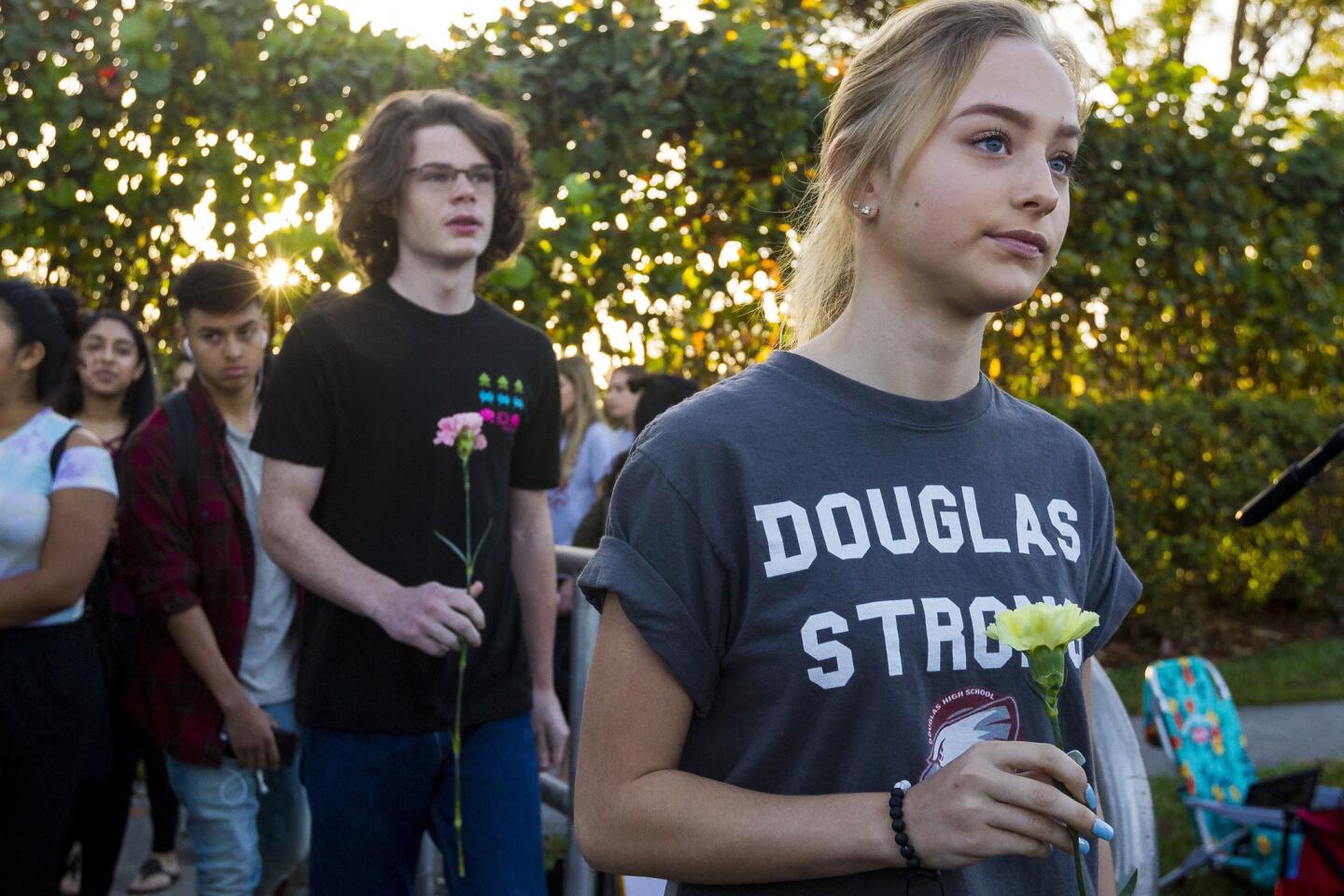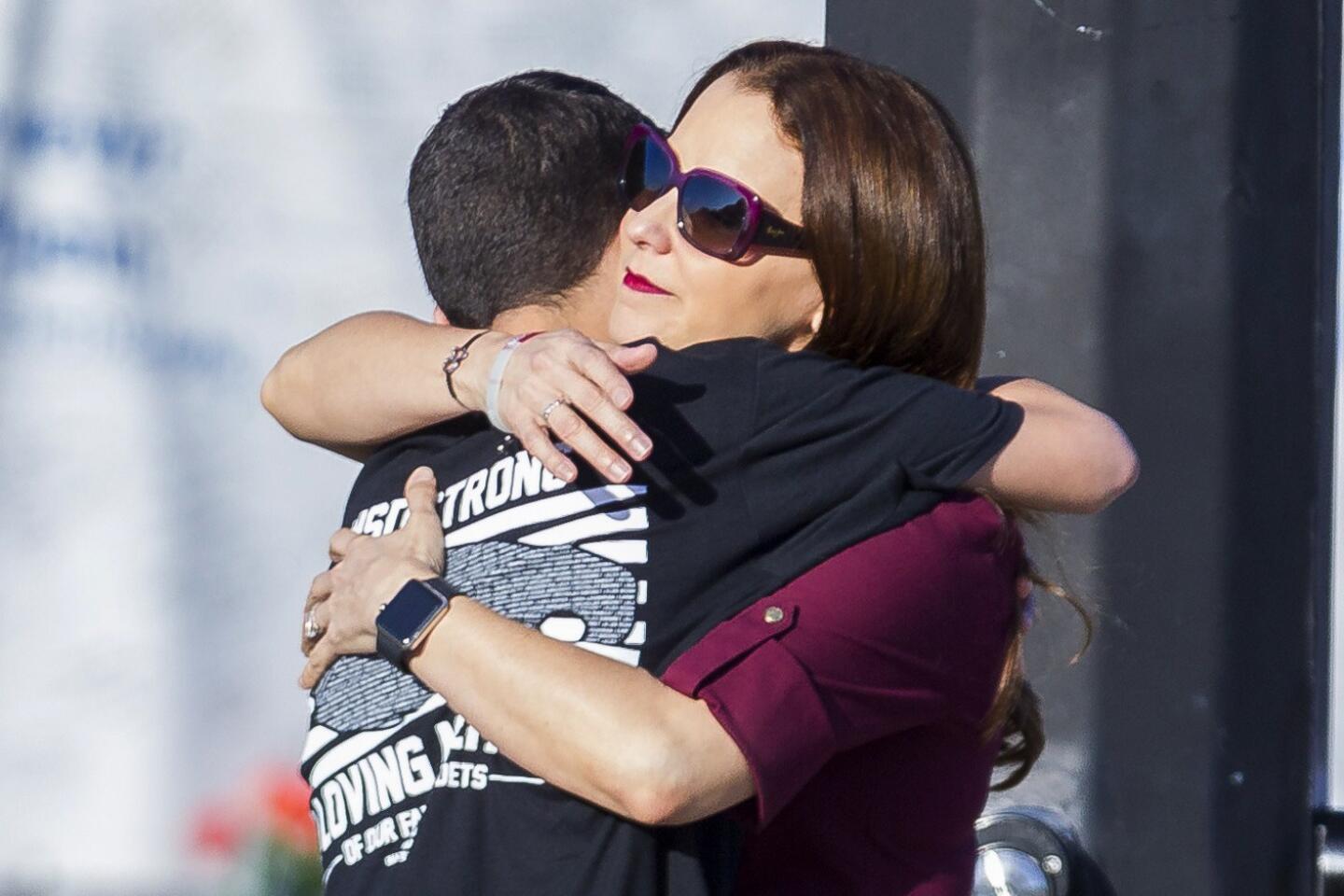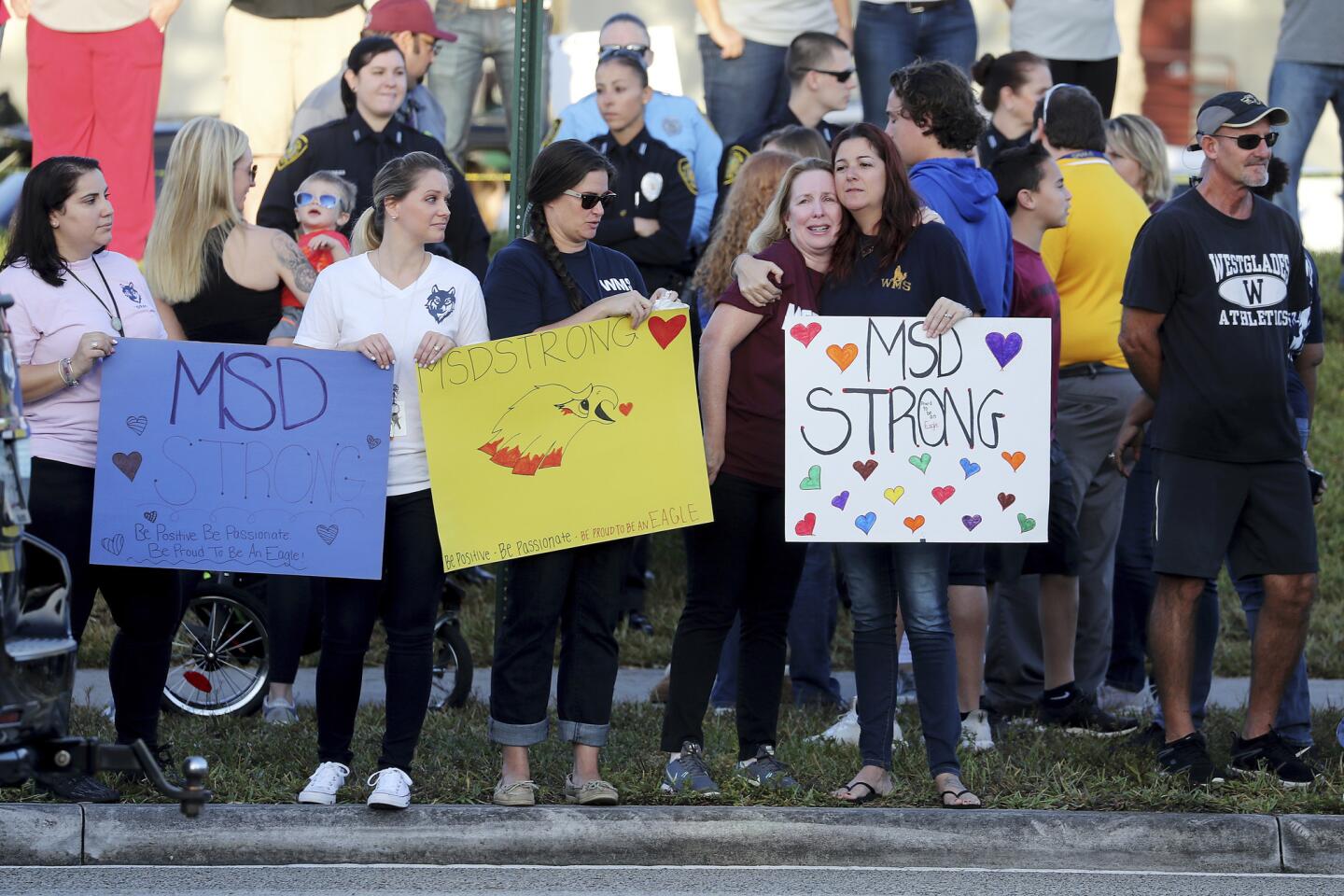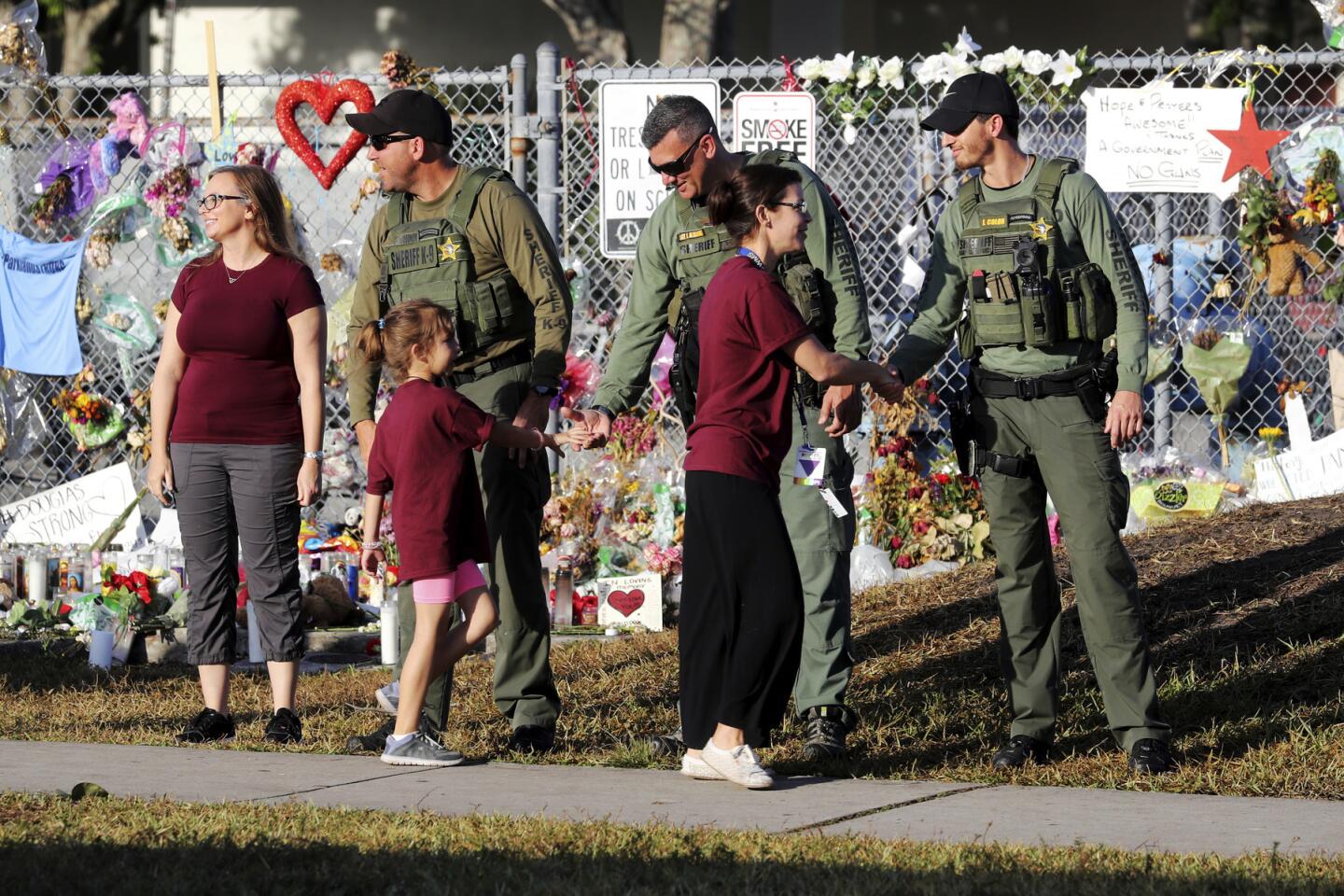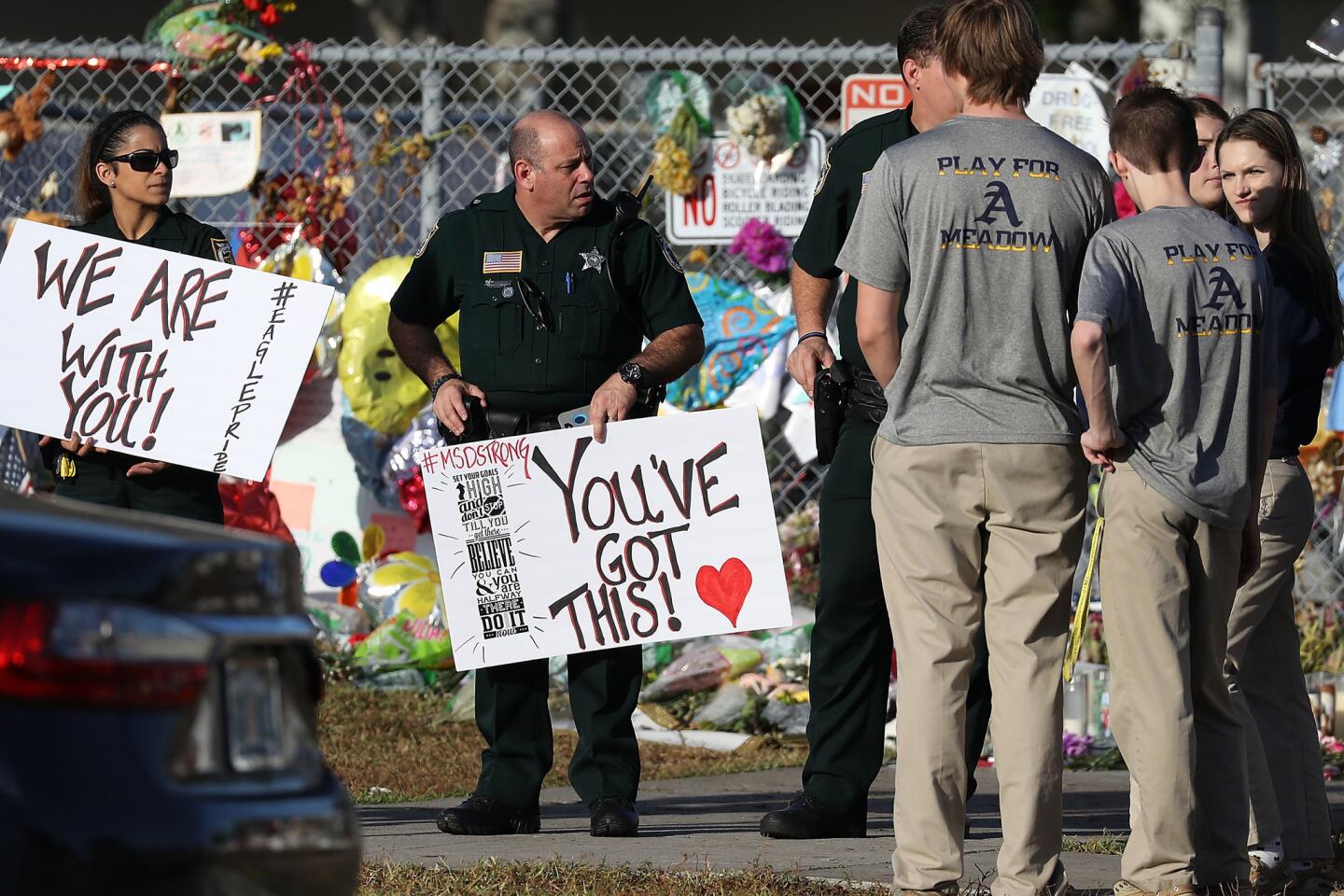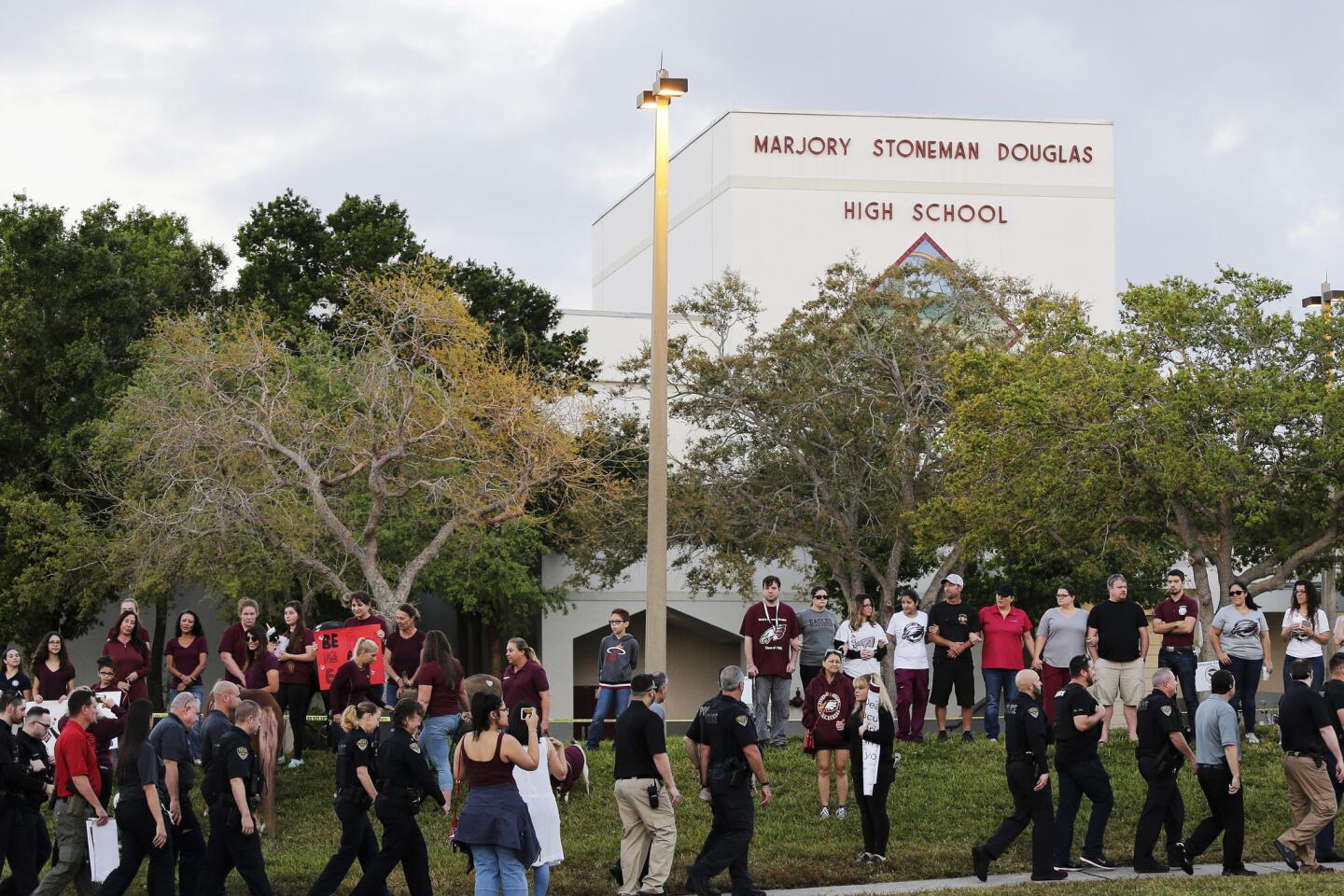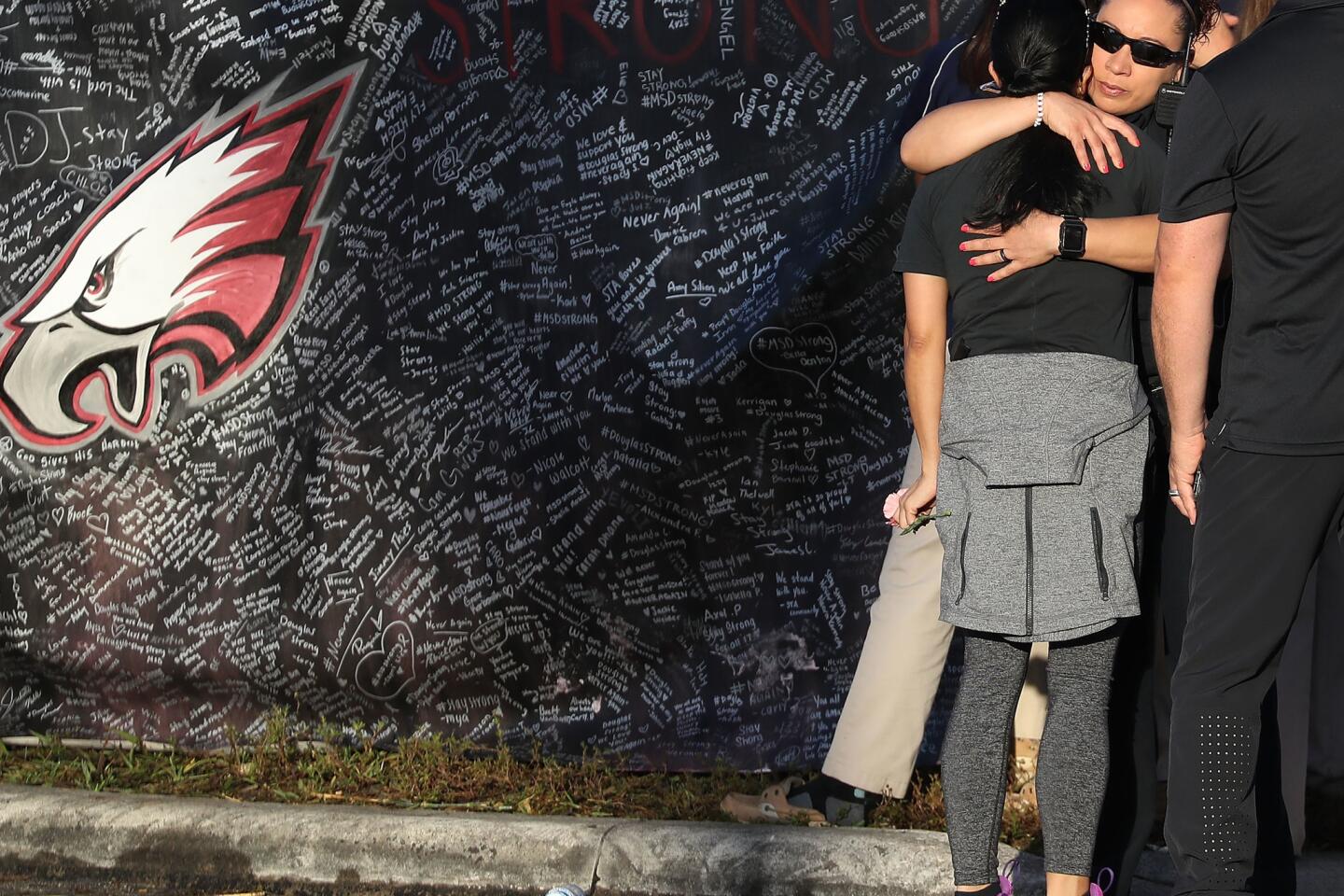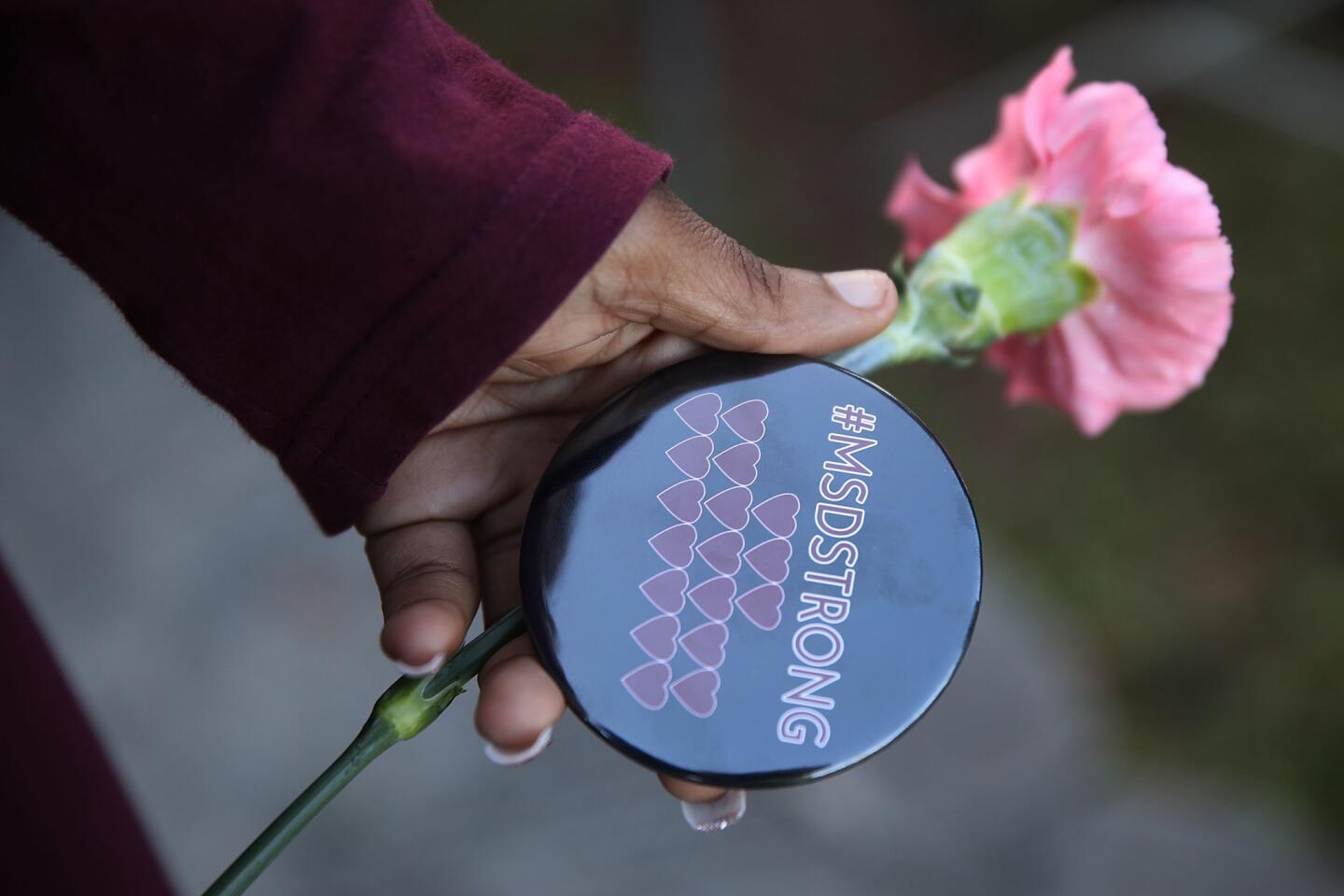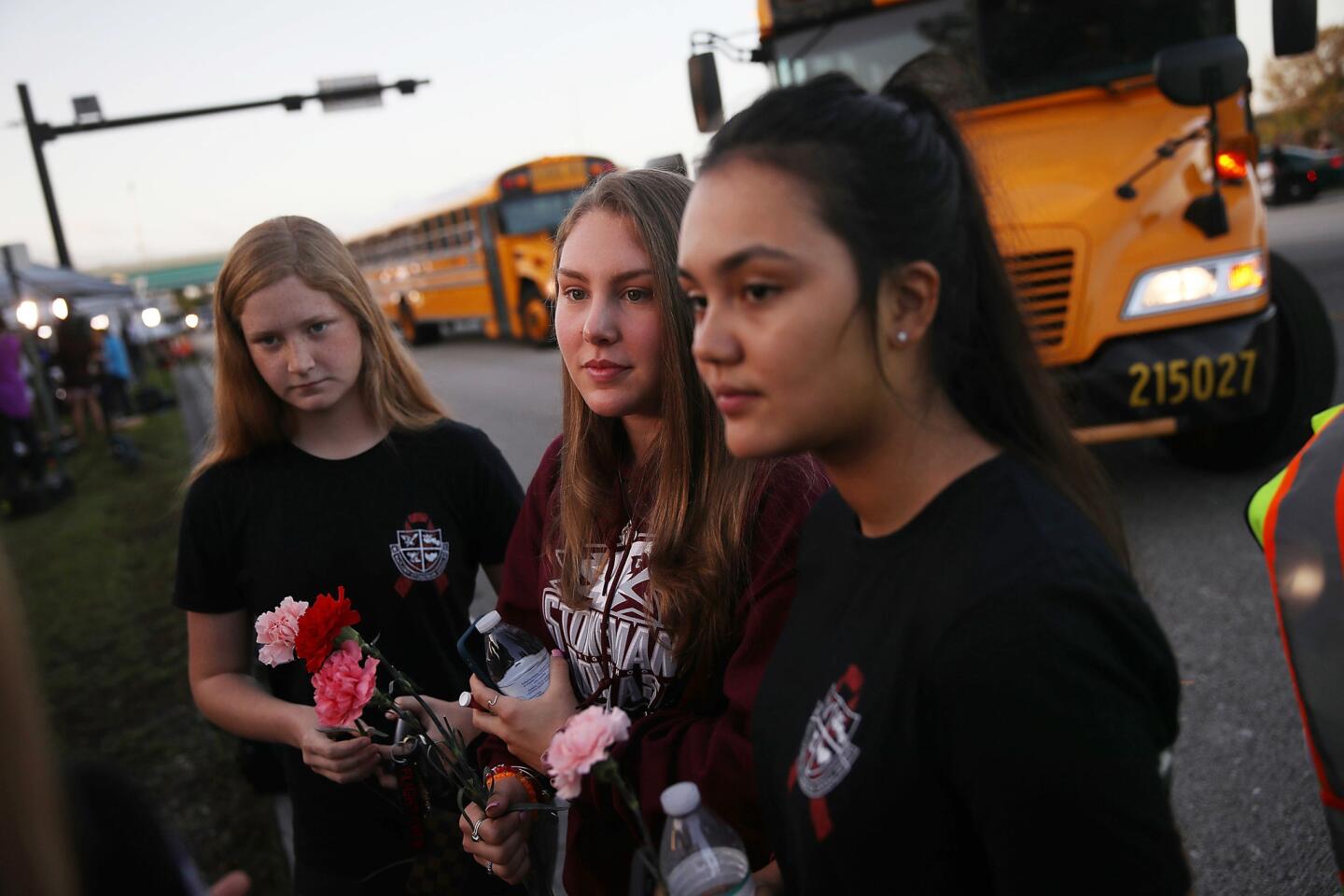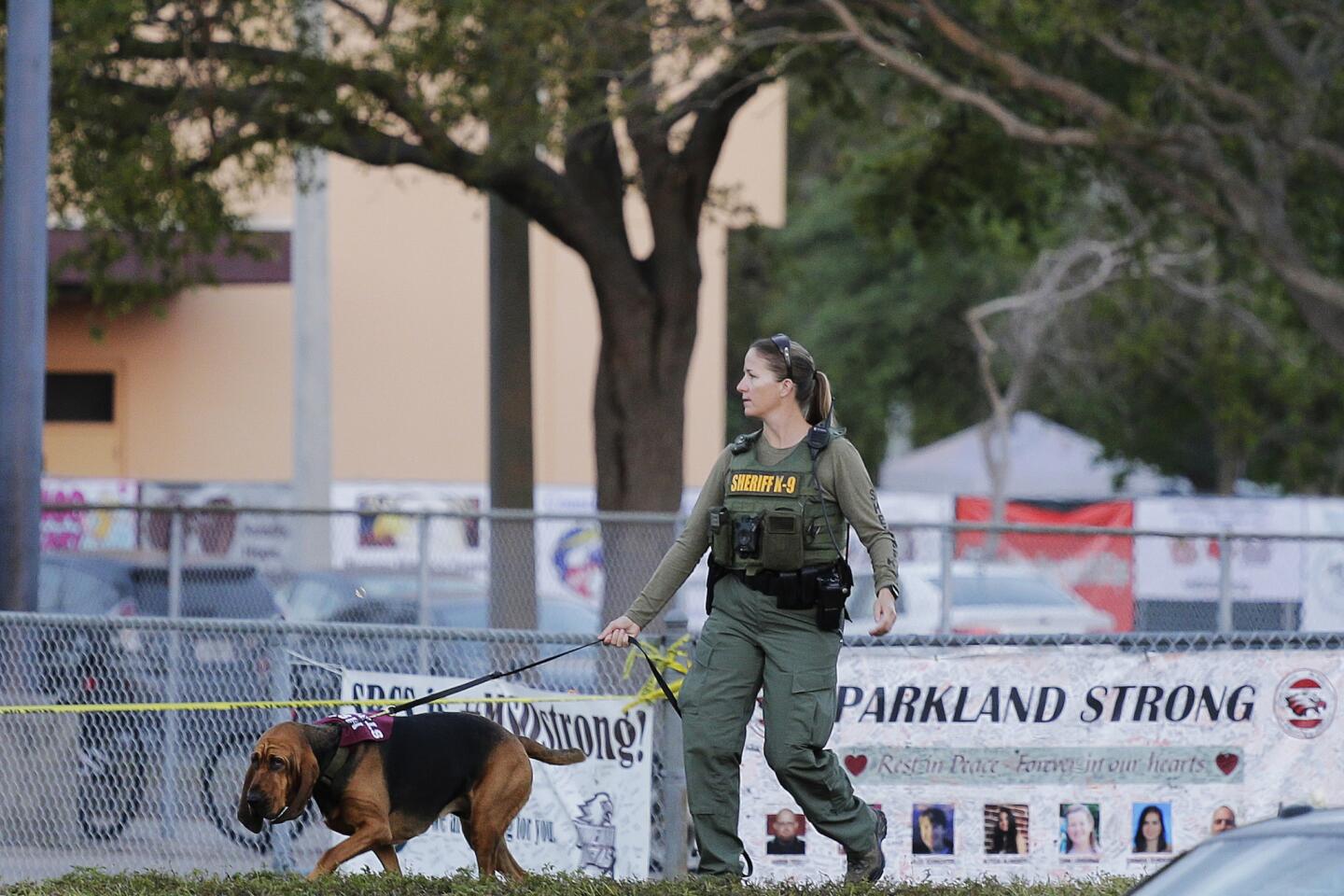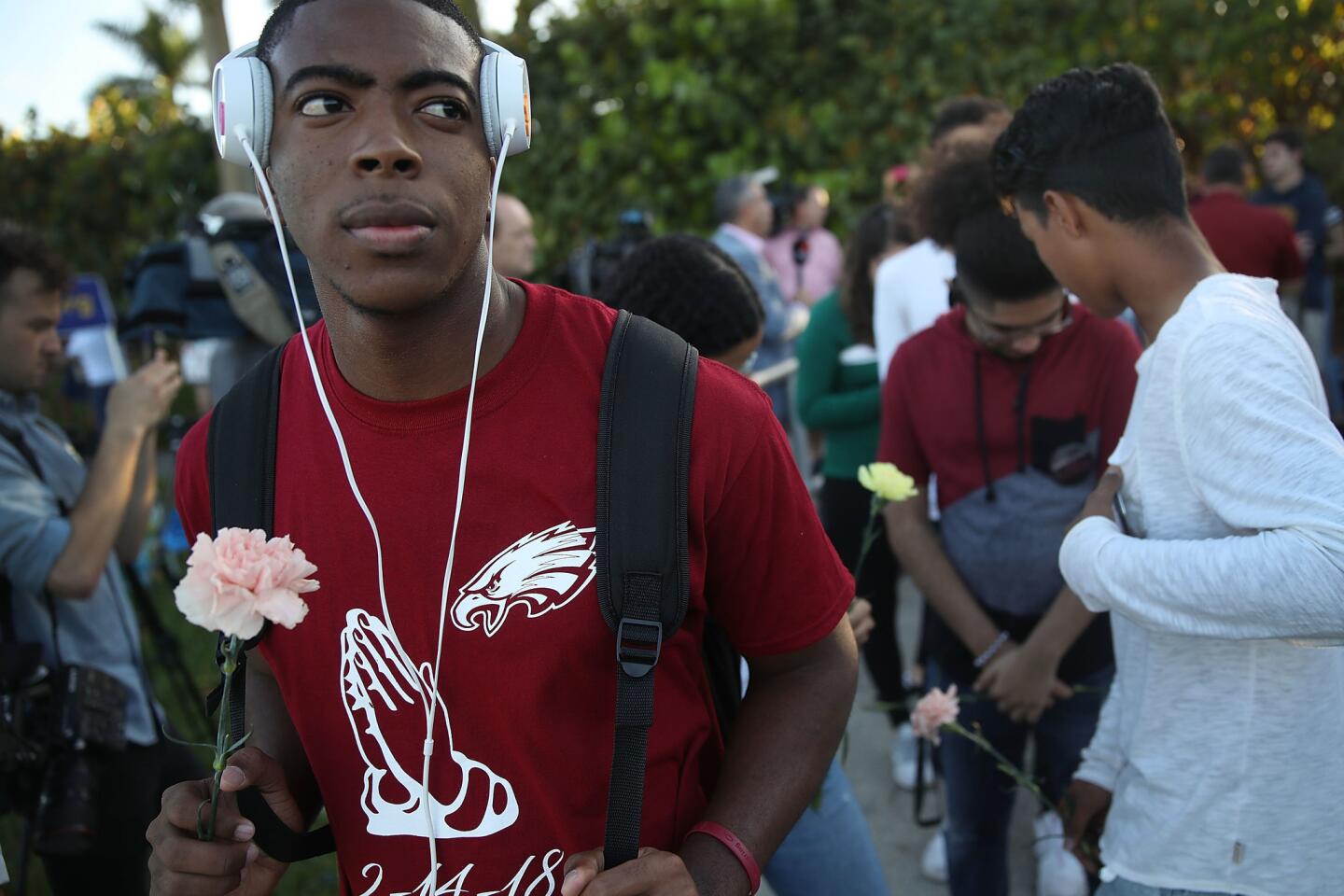Two weeks after the bloodshed, classes resume at Florida high school where gunman killed 17
- Share via
Reporting from Parkland, Fla. — Alondra Cruz was determined to go back to Marjory Stoneman Douglas High School and recapture some normalcy after a gunman rampaged through her campus two weeks ago, killing 17 classmates and instructors.
Yet the 16-year-old junior, who has had trouble sleeping since the shooting, felt nervous when her alarm went off Wednesday at 5:50 a.m.
After putting on a pair of light ripped jeans and a pink long-sleeve shirt, she opted for beige Adidas sneakers — just in case she needed to run.
At her school bus stop, a small huddle of neighborhood kids muttered quietly. Everyone sat separately when they boarded the yellow bus, staring out the window in silence as they slowly neared the high school, past flashing police cars, media TV crews and yellow police caution tape.
“I just felt chills going through my spine,” Cruz said, as she entered the sprawling complex and saw a sea of unfamiliar faces — armed guards, volunteers, grief counselors and comfort dogs. “It felt really weird, really different.”
Thousands of students, many wearing burgundy “Douglas Strong” T-shirts featuring the school’s Eagle mascot, returned to campus Wednesday and stepped back into classrooms where they had frantically scrambled to hide under desks or squeeze inside closets to escape the bullets from a teenage gunman on Valentine’s Day.
Holding hands and carrying pink and white carnations, they passed a row of white memorial crosses — one for each of the 17 victims.
Many could not help thinking about friends who did not escape. Some had bleached their hair in honor of senior Joaquin “Guac” Oliver, 17, a basketball player with a contagious personality. Others sported unity ribbons on their wrists for Gina Montalto, a 14-year-old marching band member.
As freshman Camilla Hernani approached the school’s chain-link fence, festooned with bouquets of fresh flowers, wreaths and red heart-shaped balloons, she felt confused.
The freshman building, which the shooter had targeted, was cordoned off. Authorities have proposed demolishing the three-story structure, which held 900 students. On Wednesday, that left hundreds of students without classrooms.
“I’m just going to head to the courtyard,” said Hernani, 15, as she walked onto the palm-lined campus.
Principal Ty Thompson had instructed students to leave their backpacks at home, reassuring them the abbreviated school day would be about “emotional readiness and comfort,” not academics.
Caroline Kendall’s parents walked their 14-year-old daughter to the school’s red gates and waited until she was assigned a new classroom.
“She’s ready to go back,” father Casey Kendall said. “I think she’s safe.”
David Hogg, 17, one of scores of students who gained national prominence as gun control advocates since the shooting, said he returned to set an example for his peers. But the added police presence upset him.

“It’s the same situation they’re putting us in. No bulletproof glass and even more guns. And they can’t protect us,” Hogg said.
The scene also troubled Fred Guttenberg, whose 14-year-old daughter, Jaime, was killed in the shooting.
“This is not what we envision for ourselves watching our kids go to high school,” Guttenberg said, as the lights from police cars flashed nearby.
Still, he dropped off his 17-year-old son, Jesse, at school.
“Right now, this school is probably the safest building in the country. The question is, what happens when all the police presence fades?” Guttenberg said, blinking back tears. “This is not normal, but maybe it’s going to be our new normal.”
Inside the entrance gates, students were greeted by comfort dogs and counselors. They hugged and tweeted out photos of themselves. One simply read: “Reclaim the nest.” Some wondered how soon they would return to daily routines like homework and prepping for the SAT and AP tests.
After the first bell, school officials held a 17-second moment of silence in honor of the victims.
About 95% of students came back, and only 15 students and four employees asked to be moved to another campus, said Supt. Robert Runcie. He called the school’s reopening a “major milestone.”
For 16-year-old Isabela Barry, the hardest part of the day was facing the empty chair where Helena Ramsay sat in her in physics class. The two shared a love of South Korean pop music, and Ramsey had given her a bracelet strung with pearls for her Sweet 16.
“I’m dreading going back, but at the same time, I want some normalcy,” Barry said.
Ramsay, 17, was shot as she urged a classmate to pick up a book and shield herself from the barrage of bullets.
Katherine Dadd, 17, said she felt empty without Ramsay in class. They’d been neighbors since she was 3, pedaling scooters, playing make-believe and eventually riding together to high school.
It was going to take a while, she said, to get used to not having Ramsay chatter about anime and “The Walking Dead” and sending her cute little pictures of her cats, Runty, Stripey and R2.
“I’m trying to get back in the swing of things, but the day felt a lot different,” Dadd said, pausing to hug a classmate. “I’m going to have to get used to this.”

Katherine Dadd, 17 year old junior at Marjory Stoneman Douglas High School, talks about the loss her best friend and neighbor, Helena Ramsay. (Jennie Jarvie / For the Times)
Gabriel Subero missed seeing Oliver, the basketball player and fellow Venezuelan who sat next to him in sociology class.
“We were always talking about the messed-up situation in Venezuela and how we came here to be safe,” he said. “And then this happened.”
Kyle Jeter, who has taught astronomy at Stoneman Douglas for 24 years, offered his students cookies, blueberry muffins and bagels, and invited therapy dogs into his classroom.
“I told them it’s not about grades and tests,” he said. “We’re not even close to that.”
His biggest challenge going forward, he said, was figuring out what his students survived, and how to help them. Jeter said as he sat alone in his classroom after everyone left for the day he remained in awe of colleagues and students who faced down their fears to reclaim the school.
“I didn’t lose a single student,” Jeter said, “and this was one of the hardest days of my career.”

Surrounded by a large police prescence, students return to Marjory Stoneman Douglas High School in Parkland, Fla., on Wednesday for the first time since a gunman killed 17 students and staff on Valentine’s Day.
Times staff writer Molly Hennessy-Fiske contributed to this report.
Jarvie is a special correspondent.
UPDATES:
3:40 p.m.: The story was updated throughout with new information.
11:50 a.m.: The story was updated with additional reaction from students.
10 a.m.: The story was updated with tweets from students returning to class.
8:55 a.m.: The story was updated with additional details, including statements from parents and students.
The story was originally published at 5 a.m.
More to Read
Sign up for Essential California
The most important California stories and recommendations in your inbox every morning.
You may occasionally receive promotional content from the Los Angeles Times.
